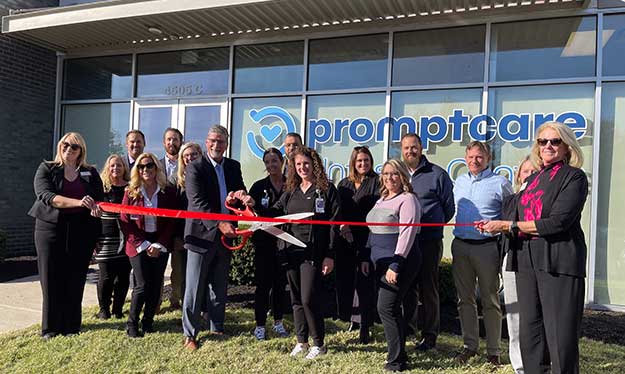Hannah’s Story

A talented showstopper springs back into action with the help of PromptCare
For most freshmen, entering high school is a frenetic mix of football games with friends, first-date jitters, and last-minute study sessions.
When Hannah was 15, she was just starting to get into the rhythm of her high school routine. She skillfully balanced school projects with long stretches of time in the dance studio, where she devoted hours to perfecting her jazz, kick, and lyrical dance moves.
Hannah’s face lights up at the mention of dance. “I can barely remember a time when my schedule wasn’t full of classes and competitions,” she recalls. “I’ve loved dance since I was four years old.”
But early in her freshman year, Hannah noticed a light purple discoloration on her hands, elbows, and knees. She chalked it off as an unpleasant side effect of the cold winter weather.
Eventually Hannah’s knuckles were so discolored that classmates wondered if she was contagious. “I always got asked about it, but I had no idea what to say. People made fun of me,” she remembers.
Surprisingly, the rashes weren’t itchy or painful. But Hannah’s mom, Kim, had concerns about the newfound attention from peers. Her daughter was withdrawing from the sport that had always brought her so much joy.
Kim wondered if the rashes could be a form of psoriasis, a common condition that causes skin cells to build up and form dry patches. Hannah’s older brother, Tyler, was diagnosed with the disorder when he was a high-school freshman.
The mother-daughter duo forged ahead to find a remedy.
There was a little back and forth with specialists to define the best course of treatment. One dermatologist prescribed psoriasis medication before referring her to an arthritis center. No one seemed to be able to explain the discoloration, and Hannah was convinced nothing would help.
That’s when she met Sandy Hong, M.D., a pediatric rheumatologist at University of Iowa Hospitals & Clinics in Iowa City.
Noting the rash formation on Hannah’s skin, Dr. Hong and her team conducted a muscle-strength assessment to check the enzymes in her blood. An MRI revealed minor muscle disease.
Dr. Hong explained that Hannah’s discoloration was a symptom of juvenile dermatomyositis (JDM), a rare autoimmune condition that causes inflammation of blood vessels and affects blood flow to the muscles.
As comforting as it was to find out the diagnosis, it didn’t change the gut-check reality of that moment when Hannah learned she had a rare disorder.
“I was relieved, but I also didn’t want people thinking I was just this person who has something weird about her. I was pretty insecure about it,” says Hannah. “But I got better once I started learning more about it.”
Luckily, she didn’t present any clinical symptoms of muscle weakness, which is often associated with a JDM diagnosis. But the absence of weakness made it all the more difficult to gauge how aggressively to treat the condition.
The experts in Iowa City recommended intravenous immune globulin (IVIg) infusions every four weeks.
The infusion treatments were initially disorienting for Hannah. The drives to the hospital were long. The infusions were even longer. Treatments lasted about five hours and were often accompanied by headaches and lethargy on the car ride home.
But over time, the purple discoloration on her skin began to fade.
Over the next year, Hannah’s mom found little ways to make the three-hour drive to Iowa City enjoyable. They always made a special stop at Panda Express to get Hannah her favorite comfort food.
But the drives were draining, especially when unpredictable winter weather made the trips twice as long. Hannah frequently missed school, too. Kim wished there was something more she could do for her daughter.
Hannah’s care team wanted to do more, too.
Hannah and Kim were ecstatic when Dr. Hong’s team suggested PromptCare perform the infusion treatments in their home.
“She was a busy high-school student, so it made sense to transition to in-home treatments,” says Courtney Kremer, ARNP, a pediatrics specialist at University of Iowa Hospital.
“We knew PromptCare was able to provide home infusion care in her area, so it worked out well. Convenience and a reputation for quality care, especially in pediatrics, played a large part in the decision to refer Hannah to PromptCare.”
Courtney Kremer, ARNP, University of Iowa Hospital
With PromptCare’s oversight, Hannah started a regimen of home infusion treatments every five weeks. Consistent treatment has helped to reduce the frequency of her infusions over time―and she may be able to space out treatments even further in the future.
Kim noticed a positive difference in her daughter. “She was a lot more relaxed. I could see that things were working out better for her. She was back to her usual self.”
They even developed an unexpected friendship with Hannah’s infusion nurse, who has been by her side from the beginning. “I can always count on her,” says Hannah. “She just always knows what to do.”
Kim echoes Hannah’s sentiment. “She goes through hoops to care for her,” she says. “She’s so great at what she does. She has been an immense comfort to us.”
Today Hannah is dancing to a different beat. The recent high-school graduate plans to pursue early childhood education in college. And she’s back in the dance studio.
Whatever It Takes.
There’s a lot going on, and you can rest assured the coordination will be there. PromptCare dedicated liaisons connect the dots of your care plan between providers, physicians, and payors.
Contact our compassionate team at 866-776-6782 to learn how we can assist you or your loved ones.

